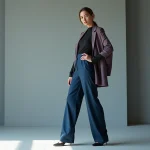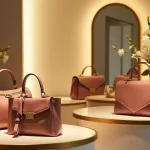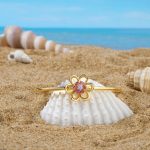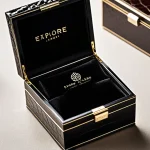Unveiling the Latest Ethical Fashion Trends for Mindful Shoppers in the UK
In recent years, the fashion industry has undergone a significant transformation, with a growing emphasis on ethical and sustainable practices. For mindful shoppers in the UK, the options for ethical fashion have never been more diverse and appealing. Here’s a deep dive into the latest trends, brands, and practices that are redefining the fashion industry.
The Rise of Sustainable Fashion
Sustainable fashion is no longer a niche market; it has become a mainstream movement. Consumers are increasingly aware of the environmental and social impact of their clothing choices, driving demand for sustainable and ethical products.
Have you seen this : Transform Your Daily Wardrobe: Expert Tips for Nailing Preppy Oxford Fashion
Environmental Impact
The fashion industry is one of the largest polluters globally, contributing significantly to air and water pollution, as well as carbon emissions. Textile production, particularly for synthetic fibers, releases harmful chemicals into the environment[3].
To mitigate this, many brands are turning to eco-friendly materials such as organic cotton, recycled polyester, and biodegradable fabrics. For instance, People Tree, a UK-based brand, uses organic cotton and recycled materials in their clothing line, ensuring a lower environmental impact[2][4].
Additional reading : The Definitive Fashion Handbook for a Memorable Night at the Royal Opera House Gala in London
Social Responsibility
Ethical fashion also focuses on fair trade practices and improving working conditions. Brands like Existential Thread and Frugi ensure that their garments are made in facilities that adhere to strict ethical standards, providing safe and dignified working conditions for garment workers[1].
Key Ethical Fashion Brands in the UK
Several brands in the UK are leading the way in ethical and sustainable fashion. Here are some notable mentions:
People Tree
People Tree is a pioneer in ethical fashion, known for its transparent supply chain and fair trade practices. The brand supports artisans from developing countries and uses organic and recycled materials in its clothing line[2][4].
Stella McCartney
Stella McCartney is a luxury brand that combines high-end fashion with eco-friendly practices. The brand uses plant-based products, recycled polyester, and organic cotton, and is vegan-friendly, avoiding non-animal-derived furs and leather[2].
Ninety Percent
Ninety Percent is a London-based brand that donates 90% of its profits to charities. It focuses on producing timeless designs to encourage less consumption and a “choose well” strategy for its customers. This approach aligns with the principles of slow fashion, promoting quality over quantity[2].
Sustainable Materials and Practices
The choice of materials is crucial in sustainable fashion. Here are some key materials and practices that are gaining traction:
Organic Cotton
Organic cotton is a staple in sustainable fashion. Brands like Kowtow and Birdsong use organic cotton in their collections, which requires fewer resources and less energy compared to conventional cotton[1][2].
Recycled Materials
Recycled materials are another important aspect of sustainable fashion. Girlfriend Collective uses recycled materials for its activewear, which are then dyed using eco-friendly dyes. This brand also has a circular economy approach, taking back old items to recycle them into new products[1].
Natural Dyes
Natural dyes are less harmful to the environment than synthetic alternatives. Brands are increasingly using natural dyes to reduce the environmental impact of their products. For example, L’Envers highlights the importance of natural dyes in sustainable fashion, noting that they require fewer resources and less energy[5].
Circular Economy and Second-Hand Fashion
The concept of a circular economy is gaining momentum in the fashion industry. This approach focuses on reducing waste and the continuous use of resources.
Second-Hand and Pre-Loved Clothing
Second-hand and pre-loved clothing are becoming increasingly popular. Brands like BEEN London and Birdsong encourage the reuse and recycling of clothing items. BEEN London, for instance, plants a tree for every bag purchased, and their approach ensures no waste is generated during production[4].
Clothing Recycling
Clothing recycling is another key aspect of circular fashion. By recycling clothing, we can reduce landfill waste and the demand for new, resource-intensive clothing items. Recycle Nation explains that recycling clothing keeps used items out of landfills and reduces the amount of waste generated during production[3].
Practical Tips for Mindful Shoppers
For consumers willing to make a change, here are some practical tips to adopt sustainable fashion trends:
Opt for Natural and Biodegradable Fabrics
- Choose clothing made from organic cotton, recycled polyester, and biodegradable fabrics. These materials have a lower environmental impact and are more sustainable in the long run[5].
Shop Second-Hand
- Consider shopping at second-hand stores or online platforms. This reduces the demand for new clothing and helps in keeping used items out of landfills[4].
Invest in Quality Over Quantity
- Adopt the slow fashion approach by investing in high-quality, timeless pieces rather than fast fashion items that may quickly go out of style[2].
Check the Brand’s Supply Chain
- Look for brands that are transparent about their supply chains and ensure fair trade practices. Brands like People Tree and Existential Thread are examples of transparent and ethical supply chains[1][4].
Table: Comparative Overview of Ethical Fashion Brands in the UK
| Brand | Materials Used | Size Range | Price Range | Notable Practices |
|---|---|---|---|---|
| People Tree | Organic cotton, recycled materials | 6-18 | £ – £££ | Fair trade, supports artisans, transparent supply chain[2][4] |
| Stella McCartney | Organic cotton, recycled polyester, plant-based products | Various | £££ | Vegan-friendly, eco-friendly dyes, high-end sustainable fashion[2] |
| Ninety Percent | Sustainable fibers | Various | £££ | Donates 90% of profits to charities, timeless designs[2] |
| Kowtow | Organic cotton, sustainable fibers | 8-14 | £££ | Ethical manufacturing, A+ in Tearfund / Baptist World Aid Ethical Fashion Survey[1] |
| Girlfriend Collective | Recycled materials, eco-friendly dyes | XS-6XL | ££ | Circular economy approach, takes back old items to recycle[1] |
| Existential Thread | Organic cotton, recycled materials | 6-20 | £ | Vegan-friendly, GOTS-certified and Fair Wear Foundation-approved facilities[1] |
| Frugi | Organic cotton, sustainable fibers | 8-18 | £ – ££ | Ethical manufacturing, maternity and nursing wear focus[1] |
| Birdsong | Organic cotton, bamboo, reclaimed fabrics | Various | £££ | Empowers women, supports women’s cooperatives and charities[2][4] |
Quotes from Industry Experts
- “The fashion industry is one of the largest polluters globally, but by choosing sustainable materials and practices, we can significantly reduce this impact.” – Recycle Nation[3]
- “Our approach is to create positive change by using only renewable and sustainable fibers, as well as ethical manufacturing.” – Kowtow[1]
- “We believe in celebrating individuality while ensuring a stable living wage for our employees at every step of the supply chain.” – Mother Of Pearl[4]
The Role of Social Media in Ethical Fashion
Social media has become a powerful tool in promoting ethical fashion trends. Brands and consumers alike use platforms like Instagram and Twitter to raise awareness about sustainable practices and fair trade.
Influencing Consumer Choices
Social media influencers often highlight ethical fashion brands and practices, influencing consumer choices. For instance, People Tree uses social media to showcase the sustainable character of every piece, allowing customers to see the impact of their purchases[4].
Transparency and Accountability
Social media also promotes transparency and accountability within the fashion industry. Brands are more likely to be held accountable for their practices when they are transparent about their supply chains and manufacturing processes.
The ethical fashion movement in the UK is robust and growing, driven by consumers who are increasingly mindful of the impact of their clothing choices. By choosing sustainable materials, supporting fair trade practices, and adopting a circular economy approach, we can make a significant difference in reducing the environmental and social impact of the fashion industry.
As Ninety Percent aptly puts it, “By donating 90% of our profits to charities and focusing on timeless designs, we encourage less consumption and a more sustainable approach to fashion.” This mindset, along with the practices of other ethical fashion brands, is paving the way for a more sustainable future in the fashion industry.
For those looking to make a change, the tips and insights provided here can serve as a starting point. Whether it’s opting for natural fabrics, shopping second-hand, or investing in quality over quantity, every choice counts in the journey towards more sustainable and ethical fashion trends.







